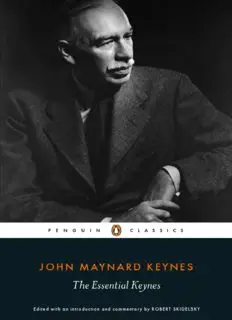
The Essential Keynes PDF
Preview The Essential Keynes
PENGUIN CLASSICS THE ESSENTIAL KEYNES JOHN MAYNARD KEYNES (1883–1946) is widely considered to have been the most influential economist of the twentieth century. His key books include The Economic Consequences of the Peace (1919); A Treatise on Probability (1921); A Tract on Monetary Reform (1923); A Treatise on Money (1930); and his magnum opus, The General Theory of Employment, Interest and Money (1936). ROBERT SKIDELSKY is Emeritus Professor of Political Economy at Warwick. His three-volume biography of Keynes received numerous awards, including the Lionel Gelber Prize and the Council on Foreign Relations Prize. John Maynard Keynes THE ESSENTIAL KEYNES Edited and with an Introduction by ROBERT SKIDELSKY PENGUIN BOOKS An imprint of Penguin Random House LLC 375 Hudson Street New York, New York 10014 penguin.com This edition first published in Penguin Classics 2015 Introduction and Notes copyright © 2015 by Robert Skidelsky Cover photograph © Corbis Penguin supports copyright. Copyright fuels creativity, encourages diverse voices, promotes free speech, and creates a vibrant culture. Thank you for buying an authorized edition of this book and for complying with copyright laws by not reproducing, scanning, or distributing any part of it in any form without permission. You are supporting writers and allowing Penguin to continue to publish books for every reader. The moral right of the author of the editorial material has been asserted. ISBN 978-0-698-40851-7 Cover photograph © Corbis Version_1 Contents About the Author Title Page Copyright Page Dedication Epigraph Preface List of Abbreviations Introduction Bibliography Keynes’s World, Main Characters One: THE PHILOSOPHER 1. ‘Ethics in Relation to Conduct’ (1904) 2. ‘The Political Doctrines of Edmund Burke’ (1904) 3. The Adding-Up Problem (1904) 4. ‘The Principles of Probability’ (1908) 5. CW 8, A Treatise on Probability (1921) 6. CW 10, ‘My Early Beliefs’ (1938) Two: THE SOCIAL PHILOSOPHER 7. CW 2, The Economic Consequences of the Peace (1919) 8. CW 4, A Tract on Monetary Reform (1923) 9. CW 9, ‘The End of Laissez-faire’ (1926) 10. CW 9, ‘Am I a Liberal?’ (1925) 11. CW 9, ‘A Short View of Russia’ (1925) 12. CW 9, ‘Economic Possibilities for Our Grandchildren’ (1930) 13. CW 21, ‘National Self-Sufficiency’ (1933) 14. CW 28, ‘The Arts Council of Great Britain: Its Policy and Hopes’ (1945) Three: THE ECONOMIST 15. CW 2, The Economic Consequences of the Peace (1919) 16. CW 4, A Tract on Monetary Reform (1923) 17. CW 5 and 6, A Treatise on Money (1930) 18. The Great Depression CW 6, A Treatise on Money (1930) CW 9, ‘ “The Great Slump” of 1930’ (1930) CW 13, ‘An Economic Analysis of Unemployment’ (1931) CW 9, ‘The Consequences to the Banks of the Collapse of Money Values’ (1932) 19. CW 13, ‘A Monetary Theory of Production’ (1933) 20. CW 7, The General Theory of Employment, Interest and Money (1936) 21. CW 14, ‘The General Theory of Employment’ (1937) 22. CW 14, ‘Alternative Theories of the Rate of Interest’ (1937) 23. CW 14, Methodological Issues: Tinbergen, Harrod (1938) Four: THE POLICY-MAKER 24. CW 2, The Economic Consequences of the Peace (1919) 25. CW 17, ‘A Plan for a Russian Settlement’ (1922) 26. CW 4, A Tract on Monetary Reform (1923) 27. CW 9, ‘The Economic Consequences of Mr Churchill’ (1925) 28. CW 9, ‘Can Lloyd George Do It?’ (1929) 29. Policies for the Slump CW 9, ‘Proposals for a Revenue Tariff’ (1931) CW 9, ‘The Economy Report’ (1931) CW 9, ‘On the Eve of Gold Suspension’ (1931) CW 9, ‘The Economy Bill’ (1931) CW 9, ‘The End of the Gold Standard’ (1931) 30. CW 9, ‘The Means to Prosperity’ (1933) 31. The New Deal CW 21, ‘Dear Mr President’ (1933) CW 21, ‘Agenda for the President’ (1934) CW 21, ‘Can America Spend Its Way into Recovery?’ (1934) CW 21, ‘Letter to the President’ (1938) 32. CW 28, ‘British Foreign Policy’ (1937) 33. CW 21, ‘How to Avoid a Slump’ (1937) 34. CW 22, ‘Paying for the War’ (1939) 35. Full Employment Policy CW 27, Keynes to Sir Richard Hopkins (1942) CW 27, Keynes to J. E. Meade (1943) CW 27, The Long-Term Problem of Full Employment (1943) CW 27, Letter to T. S. Eliot (1945) 36. CW 25, ‘The Clearing Union’ (1941) 37. CW 24, ‘Overseas Financial Policy in Stage III’ (1945) 38. CW 27, ‘The Balance of Payments of the United States’ (1946) Five: THE ESSAYIST 39. CW 10, ‘The Council of Four, Paris’ (1919), ‘Lloyd George: A Fragment’ (1933) 40. CW 10, ‘Dr Melchior: A Defeated Enemy’ (1920) 41. CW 10, ‘Alfred Marshall’ (1924) 42. CW 10, ‘Thomas Robert Malthus’ (1933) 43. CW 10, ‘Newton the Man’ (1946) Quotable Quotes Notes To Warwick University, which gave me the time to study economics ‘Economics is a very dangerous science’ John Maynard Keynes, ‘Thomas Robert Malthus’
